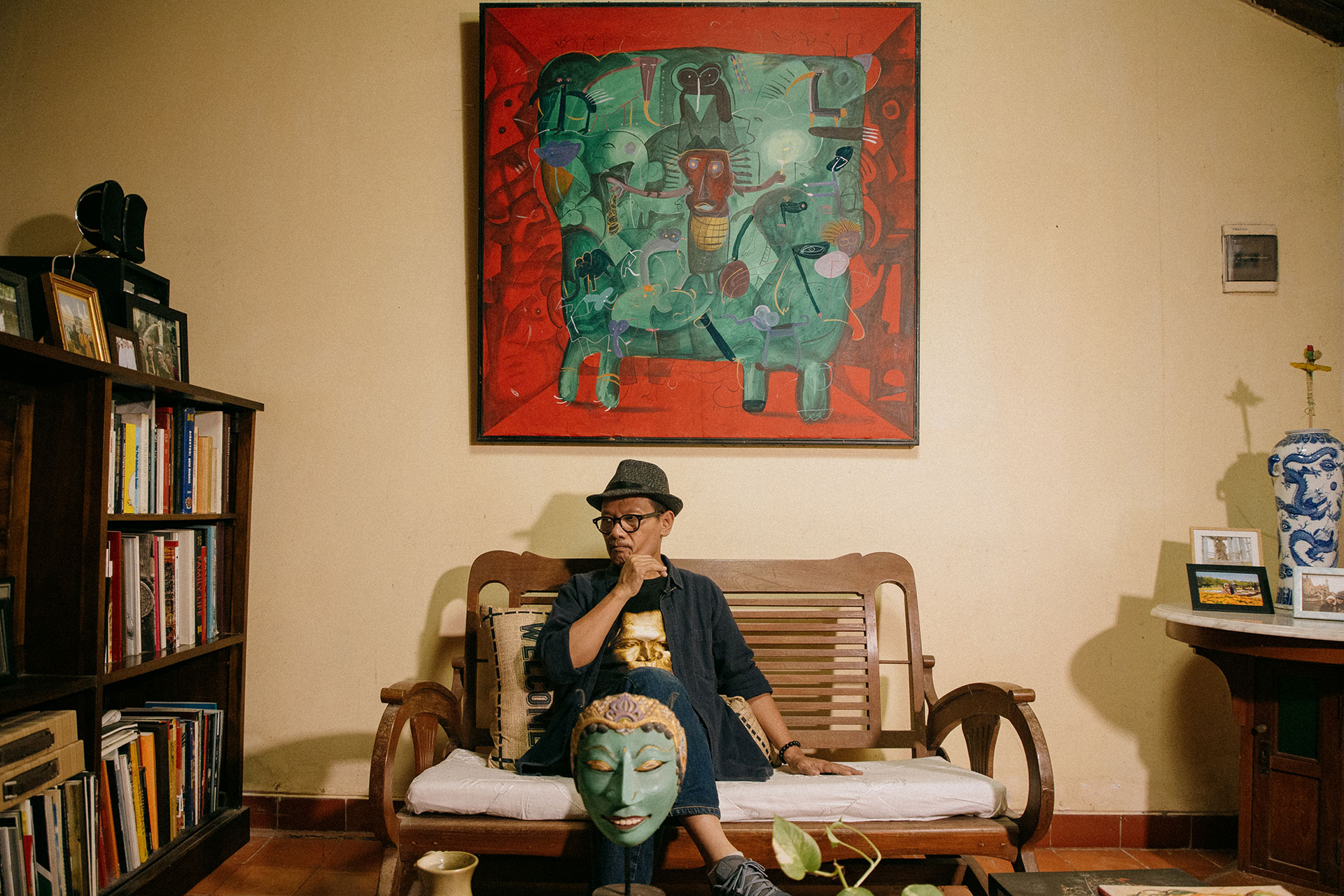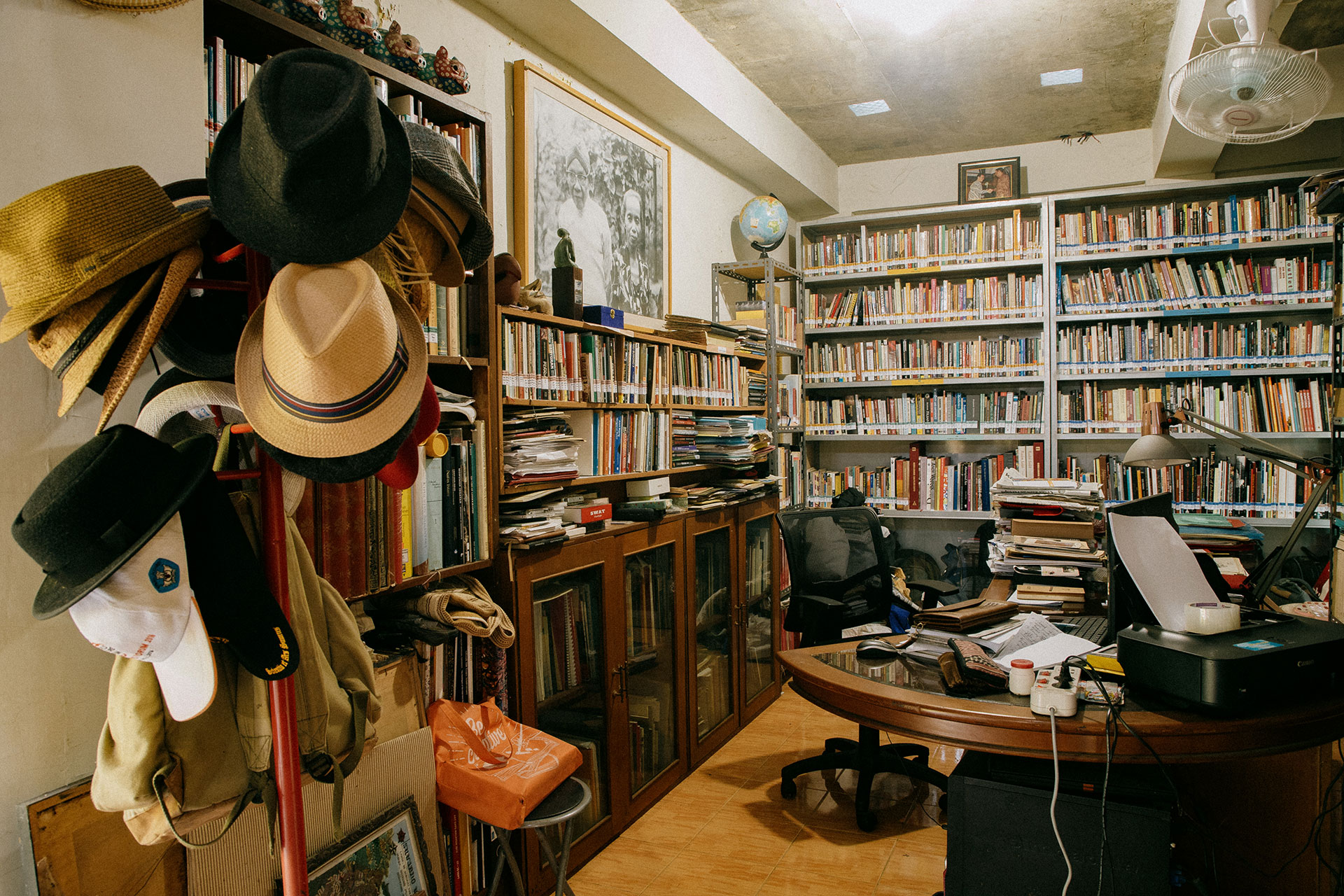Free Shiping All Around Indonesia
Free Shiping All Around Indonesia

“This is my hat collection. A few of them are gifts from friends and colleagues. They know what to bring me whenever they’re back from a trip,” says Suwarno when asked about the many fedora hats hanging on a rack in the corner of his home office. It is one of many interesting details captured in my mind upon entering the abode of Suwarno Wisetrotomo in the Eastern part of Yogyakarta. “Of course, I’ll wear a hat later. All of my public appearances have to feature one of these,” he adds while laughing when one of our photographers asked if he would wear a hat during the photoshoot.
Suwarno Wisetrotomo (60) is a man of many hats. Not just because of the collections that I previously mentioned, but also because of the many titles he has up on his sleeves. He teaches at the Indonesian Institute of the Arts (ISI) Yogyakarta and Gadjah Mada University (UGM), curates for the National Gallery and RJ Katamsi Gallery, as well as writes books on curatorial, arts, and everything surrounding it. Ultimately, he would tell me later during our conversation, all of his hats are in one shape: the shape of knowledge.
It’s heartwarming to see the man still professing the same genuine love for the world he has come to love since kid. The evidence of this love trickles around the house: a jaw-dropping collection of books, paintings big and small adorning every wall of his joglo-style house, and the gratuitous message scribbled along with an autograph on my copy of his most recent book Kuasa Rupa, Kuasa Negara (2021). We sat down in a breezy afternoon in his living room to talk about art, books, and how his way of being curator came to be.

How did your fascination for art come to be?
SUWARNO: Where and when I became interested in art is a bit of a mystery. The story began like this: I had loved drawing even before I enrolled in school. The moment I began my school year, art became the subject I was most interested in. Second, and I feel like this is an important piece to share, my elementary school teacher understood their students’ interests. I had a teacher who always appreciated my art very sincerely. “Suwarno, you can be great just like Raden Saleh,” they said to me back then. It’s something I never forgot. Of course, I had no idea who Raden Saleh was, but my teacher made it sound so amazing that it was imprinted in my mind. Back then, every time there was an art competition, this teacher always sent me to participate. This is how I make sense of it: that teacher’s role is very crucial, to accentuate and highlight their students’ ability, and then push them to achieve it.
During junior high, I was dreaming of enrolling in an art school. I asked my parents’ permission to go to one, at that time it was called SSRI (Sekolah Seni Rupa Indonesia/Indonesia Visual Arts School), but my father said to pursue something easier instead. Easier, in his dictionary, meant becoming a teacher, because my older siblings were teachers, and I was the youngest child. In the ’70s, teaching was a respectable job with high social status, and my father suggested that I pursue it. At that moment, I was just agreeing with him, but as soon as I graduated, I still told him that I wanted to go to an art school. And the school was in Jogja, in the city. And the incredible thing was, my father let me, without debate or any objections. My mother, of course, would agree with him as well. So there it was, I enrolled in SSRI and had to move out of the house to live in Jogja. If we followed through the timeline, I spent four years at SSRI, then in 1982, I enrolled in STSRI ASRI Yogyakarta (Sekolah Tinggi Seni Rupa Indonesia ASRI/ASRI Arts Academy), which now has changed into ISI Yogyakarta (Institut Seni Indonesia/Indonesia Institute of the Arts).
Seeing your book collections, one can immediately guess that reading means a lot to you.
SUWARNO: Ah, yes thank you for noticing. Since elementary school, I have always been hungry for books. It was up to the point where my teachers were a bit overwhelmed because I had read all the school library’s book collections, and the collection wasn’t even that much. They even lent me books that were meant for kids above my age! (laughs). I always want to read every day. The need to read got fulfilled in middle school, where the library was bigger than the elementary’s. After middle school, I moved to Jogja to study at SSRI and the need became more fulfilled. It wasn’t that I bought my own book, but I borrowed them from friends or the library. I also went to bookstores, not to buy books, but to sneak-read! (laughs) Because it was still expensive back then.
What about writing?
SUWARNO: Yes, the interesting part about this is that I loved to write as well. I started to write when I was in high school. My generation had the privilege to grow together with the golden era of print media. So many newspapers and magazines; definitely a golden era. In 11th grade, my writings began to get published in the newspapers. What did I write? Everything! From poetry to short stories to coverage of art events. I even became a part of the committee for Yogyakarta’s high school writers organization. There, I met so many friends and competed every chance we got. The desire to write never stopped. At the same time, my interest in practicing art was still as high. I was still painting, as well as writing.
Want to know the secret to my ambition? It was because my role model at that time was Sudjojono. Sudjojono was an artist whose paintings were extraordinary, his writings were excellent, and his thoughts were progressive. He was famous as well. He was all I aspired to be. That’s number one. Second, the writing atmosphere has grown around me since high school. I was in the same school year as Butet Kartaredjasa. We have competed since high school, but Butet had a headstart in writing. Whenever I met him on Mondays, he would be shouting from afar, telling me about his pieces that got published in this newspaper or that newspaper. Because articles about art usually got published on Sundays back then. Of course, it lit the fire of ambitions inside me. If he can do it, then I can too, I had thought back then. So, seeing Butet writing so diligently, I became motivated, and the fire never goes out until now.